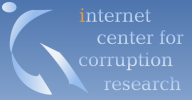
| Home → Lecture → Syllabus |  |
| Home | |||
| Contact information | |||
| Research Area | |||
| Corruption Perceptions Index | |||
| Lecture and Workshops |
The Econonomics of Corruption -- Syllabus
The following topics will be covered in the lecture:- About the Immeasurable
Why study corruption? Is there an empirical approach to determining its adverse effects? What do empirical studies reveal about the causes and consequences of corruption?
Definitions and opportunities. What are the various approaches to define the term "misuse" in a definition of corruption? How can bribery, fraud, embezzlement and extortion be described with the help of a principal-agent model? In how far may bribery go along with fraud or extortion? How can one distinguish corruption from related phenomena such as gift-giving and lobbying? Which sectors are vulnerable to corruption?
Quantitative Assessments. What are the problems with objective data on corruption? What does the term "degree of corruption" mean? What are the pros and cons of a composite index? What are the potential biases that arise with subjective assessments of corruption? How do individual sources assess the degree of corruption?
- Individual Calculus and Public Welfare (--> not covered in 2007)
Corruption and regulation. How does bureaucratic discretion affect the behavior of public servants? How does a regulated market compare to one where public servants maximize income from corruption? What are the pros and cons of speed money? Why can corruption be a cause of market distortions! In how far may corruption undermine the selection of the best qualified bidder? In how far may the decision which goods to buy in public procurement be distorted by corruption?
Incentives, ethics, and punishment. How can bureaucrats be induced to serve the public? What is the role obtained by monetary inducements that promote honesty? In how far can these be implemented? In how far can incentives reduce corruption? Why may penalties crowd our and intrinsic motivation?
Business people's dilemma. In the absence of ethical considerations, how would business people and public officials determine whether to engage in bribery? How may "moral costs" enter into the calculus? What forces the bottom line of the moral code to win out? Why may ethics survive competition? What is rent-seeking as opposed to profit-seeking? Why is competition for rents not as bad as suggested by rent-seeking theory? What are the pros and cons of lobbies which strive for broader interests?
Supply of corrupt services. Does competition for political positions increase or decrease corruption? How may independent departments "overgraze the market" when requesting bribes? What type of corruption emerges when self-seeking is the actual object of government? Why does a perfect kleptocrat avoid welfare losses? Why is such a static analysis insufficient?
- Corruption and The New Institutional Economics
Corruption as an arduous business. Why are transaction costs in corrupt exchanges particularly large? How does a public official advertise his corrupt service? What are the methods for concealing a corrupt payment? In how far does contract enforcement represent a problem to corrupt parties?
Making corrupt deals: contracting in the shadow of the law. How may middlemen lower transaction costs? How can repetitive exchange act as an instrument for securing corrupt deals? How do corrupt partners integrate vertically when trying to safeguard against opportunism? In how far can "social embeddedness" act as a facilitator to corrupt transactions? How does denunciation contribute to an analysis of transaction costs?